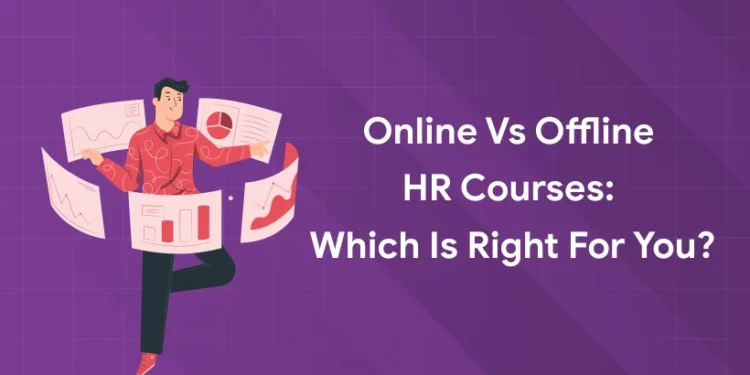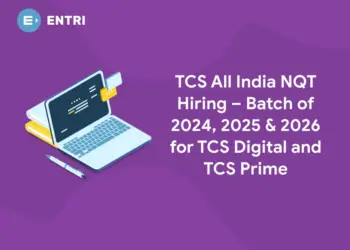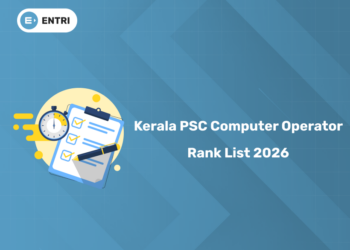Table of Contents
Key Takeaways:
- Online HR courses offer flexibility, affordability, and practical learning for busy professionals.
- Offline HR courses provide networking, mentorship, and structured learning for students and fresh graduates.
- Both formats offer placement support and industry-recognized certifications.
- Choose based on your career goals, learning style, and budget.
- Accreditation and curriculum relevance are crucial for career growth.
Introduction
The world of HR education is evolving rapidly, and professionals today have more choices than ever before. Whether you’re a working executive, a recent graduate, or someone looking to pivot into HR, the decision between online and offline courses can shape your career path. With HR roles projected to grow steadily and employers increasingly demanding certified professionals, understanding the nuances of each learning format is essential for making the right choice.
Imagine balancing your job, family, and the desire to upskill—all while keeping up with the latest trends in HR. The flexibility of online learning or the immersive experience of classroom-based courses each offer unique advantages. Both formats can equip you with the skills needed for success in HR, but the best fit depends on your personal circumstances, career aspirations, and learning style.
Online HR Courses: Flexibility and Modern Learning
- Online HR courses allow you to study anytime, anywhere, making them ideal for working professionals, career switchers, or those with busy schedules.
- You can access learning materials on any device—laptop, tablet, or smartphone—so you can learn on the go or during breaks.
- Most courses are self-paced, letting you complete modules at your own speed and revisit content whenever needed.
- The curriculum covers key HR topics like recruitment, training, labor laws, performance management, and HR analytics.
- Many programs offer specialized tracks in areas such as talent acquisition, employee engagement, and HR technology.
- You’ll learn through a mix of video lectures, interactive modules, quizzes, and real-world case studies, making the experience engaging and practical.
- Online courses provide access to global faculty and industry experts, giving you insights into international HR practices and the latest trends.
- Placement support, career guidance, and access to job portals help graduates transition smoothly into HR roles.
- Fees are generally lower than offline courses, and many platforms offer financial aid or affordable payment plans.
- Completing an online HR course demonstrates commitment to professional development and boosts your resume.
Also read: HR Certification vs HR Degree: Which to Choose?
Is being an HR professional your dream? Enrol now for our course on Human Resources!
Become an HR Expert – Enroll in Our HR Management Course Today!
Unlock the secrets to effective Human Resource Management with our expert-led course! Learn recruitment, employee relations, performance management, and more to build a thriving workplace. Start your journey toward a successful HR career today!
Know MoreOffline HR Courses: Structure and Networking
- Offline HR courses are held in physical classrooms, offering a structured, in-person learning environment.
- The curriculum covers HR fundamentals, compliance, and practical skills, with hands-on workshops and real-time feedback from experienced faculty.
- You’ll attend fixed class schedules, allowing for a disciplined approach to learning and regular interaction with instructors.
- Face-to-face interaction with peers and instructors fosters strong networking opportunities and builds professional relationships.
- Many offline courses include campus placement drives and direct access to recruiters, increasing your chances of securing a job after completion.
- Group discussions, team projects, and extracurricular activities enhance collaboration and communication skills.
- The immersive learning experience and structured schedule are ideal for students, fresh graduates, and those who thrive in group settings.
- Offline courses often provide a sense of community and support, helping learners stay motivated and engaged.
- Costs are generally higher due to campus fees, material expenses, and possible relocation, but the comprehensive support and networking opportunities make it a valuable investment.
People also read: Non-IT Students’ Guide to HR
Key Differences Between Online and Offline HR Courses
| Feature | Online HR Courses | Offline HR Courses |
|---|---|---|
| Learning Format | Self-paced, virtual, flexible | Fixed schedule, classroom-based |
| Certification | Industry-recognized, digital | University/institute recognized |
| Placement Support | Job portals, career guidance | Campus drives, local recruiters |
| Cost | Lower | Higher |
| Interaction | Forums, live chats, video calls | In-person, group discussions |
| Networking | Limited | Strong |
| Accessibility | Nationwide, remote access | Location-dependent |
| Course Variety | Wide range, specialized options | Fewer specialized courses |
| Tools & Tech Focus | Modern HR tech, analytics | Traditional HR tools |
| Assessment Style | Online exams, projects | Exams, practicals, presentations |
You might also like: How to Become an HR Professional: Step-by-Step Guide
Factors to Consider When Choosing an HR Course
-
Career Goals:
- Determine if you want a broad HR foundation or a specialized track (e.g., HR analytics, talent management, compliance).
- Consider whether the course aligns with your short-term and long-term career aspirations.
-
Learning Style:
- If you prefer self-paced study and flexible schedules, online courses are ideal.
- If you thrive in group settings and benefit from in-person interaction, offline courses may suit you better.
-
Work-Life Balance:
- Online courses allow you to study around your work and family commitments, making them perfect for working professionals.
- Offline courses require fixed class times and may demand more time and travel.
-
Budget:
- Online courses are generally more affordable, with fees ranging from ₹10,000 to ₹50,000.
- Offline courses can cost ₹50,000 to ₹2,00,000 or more due to campus fees and material expenses.
-
Location:
- Online courses offer nationwide access, so you can learn from anywhere.
- Offline courses may require relocation or daily commutes, depending on the institute.
-
Course Accreditation:
- Choose courses accredited by recognized bodies like SHRM, HRCI, or CHRMP for better job prospects.
- Accredited courses are valued by employers and ensure curriculum relevance.
-
Placement Support:
- Look for courses that offer placement assistance, career guidance, and access to job portals.
- Offline courses often include campus placement drives and direct access to recruiters.
-
Faculty and Mentorship:
- Research the expertise and teaching approach of instructors.
- Courses with experienced faculty and mentorship provide better learning outcomes.
-
Reviews and Alumni Feedback:
- Read reviews and alumni feedback to gauge course quality and effectiveness.
Also read: Arts Student’s Guide to a Career in HR
Become an HR Expert – Enroll in Our HR Management Course Today!
Unlock the secrets to effective Human Resource Management with our expert-led course! Learn recruitment, employee relations, performance management, and more to build a thriving workplace. Start your journey toward a successful HR career today!
Know MoreReal-World Impact: Placement and Job Market
-
Increased Job Opportunities:
- Certified HR professionals are 30% more likely to secure job offers in 2026.
- Both online and offline courses offer placement support, but online programs increasingly partner with job portals and multinational recruiters.
-
Higher Salary Packages:
- HR professionals with recognized certifications enjoy higher salary packages and better career progression.
- Employers value industry-recognized certifications from reputable providers.
-
Industry Demand:
- The demand for certified HR professionals is growing, with HR roles projected to increase by 8% annually.
- Employers seek candidates with up-to-date skills in compliance, analytics, and strategic HR planning.
-
Placement Support:
- Many online courses provide placement assistance, career guidance, and access to job portals.
- Offline courses often include campus placement drives and direct access to recruiters.
-
Global Recognition:
- Industry-recognized certifications are accepted by employers across sectors, ensuring better career prospects and job security.
Pros and Cons Summary
Online HR Courses
- Pros: Flexibility, affordability, global reach, practical projects, and placement support.
- Cons: Limited networking, self-discipline required, and less personal mentorship.
Offline HR Courses
- Pros: Networking, mentorship, structured learning, and campus placements.
- Cons: Higher costs, fixed schedules, commute, and limited course variety.
You might also like: How Gen Z is Forcing HR to Rewrite the Rules of Workplace
Which Is Right for You?
-
Choose Online HR Courses If:
- You have a busy schedule and need flexible learning hours.
- You want to study from home or any location without commuting.
- You prefer self-paced learning and want to revisit topics as needed.
- You’re a working professional or someone balancing family commitments.
- You want access to modern HR tools, analytics, and global faculty.
- You’re comfortable with digital platforms and don’t mind limited face-to-face interaction.
-
Choose Offline HR Courses If:
- You thrive in structured, classroom-based environments.
- You value in-person mentorship and direct feedback from instructors.
- You want to build strong professional networks with classmates and industry experts.
- You prefer group discussions, hands-on workshops, and campus activities.
- You have the time and resources to commit to fixed schedules and possible relocation.
- You want direct access to campus placement drives and local recruiters.
You might also like: Top Reasons Why You Should Enroll in an HR Course
How to Find a Good HR Course
-
Accreditation:
- Look for courses accredited by recognized bodies like SHRM, HRCI, or CHRMP for better credibility and job prospects.
- Accredited courses ensure curriculum relevance and industry recognition.
-
Curriculum Relevance:
- Ensure the course covers current HR trends such as compliance, analytics, diversity, and strategic planning.
- Choose programs with practical projects and real-world case studies for hands-on learning.
-
Faculty and Mentorship:
- Research the expertise and teaching approach of instructors.
- Courses with experienced faculty and mentorship provide better learning outcomes.
-
Placement Support:
- Look for courses that offer placement assistance, career guidance, and access to job portals.
- Offline courses often include campus placement drives and direct access to recruiters.
-
Reviews and Alumni Feedback:
- Read reviews and alumni feedback to gauge course quality and effectiveness.
- Platforms like Coursera, Udemy, and Alison offer user reviews for each course.
-
Course Variety:
- Choose programs that offer a wide range of specializations, such as talent management, HR analytics, or compliance.
- Ensure the course aligns with your career goals and learning style.
-
Flexibility and Accessibility:
- Online courses offer nationwide access and flexible schedules, making them ideal for working professionals.
- Offline courses may require relocation or daily commutes, so consider your location and availability.
Also read: Top Online HR Management Courses in Kerala
Boost Your HR Career with Entri’s HR Management Course
Entri’s HR Management Course in Kerala is designed for aspiring HR professionals seeking a competitive edge. The course offers a comprehensive curriculum covering HR fundamentals, compliance, talent management, and analytics. With placement assistance, flexible learning options, and expert mentorship, Entri’s course prepares you for real-world HR challenges and career advancement.
Enroll today and take the first step toward a rewarding HR career with Entri’s HR Management Course: Entri HR Management Course in Kerala
Conclusion
Whether you choose online or offline HR courses, both formats can equip you with the skills and certifications needed for a successful career in HR. Align your choice with your personal and professional goals, and take advantage of the opportunities each format offers. Stay informed, stay flexible, and take charge of your professional journey in the dynamic world of HR.
| Related Links | |
| Top Human Resource Blogs to Follow | How to build a remote HR career |
| HR Certification vs HR Degree | Which one to choose? | 15 HR Intern Interview Questions and Sample Answers |
Become an HR Expert – Enroll in Our HR Management Course Today!
Unlock the secrets to effective Human Resource Management with our expert-led course! Learn recruitment, employee relations, performance management, and more to build a thriving workplace. Start your journey toward a successful HR career today!
Know MoreFrequently Asked Questions
Are online HR courses valid for jobs?
Yes, many online HR courses offer industry-recognized certifications accepted by employers.
Do employers prefer offline certificates?
Both formats are valued, but offline certificates may be preferred for structured learning, while online certificates are recognized for flexibility and modern skills.
What are the costs for both?
Online courses are generally more affordable, ranging from ₹10,000 to ₹50,000, while offline courses can cost ₹50,000 to ₹2,00,000 or more.
Can I switch between modes?
Some institutes offer blended learning options, allowing you to switch between online and offline formats.
Are there blended options?
Yes, many institutes now offer hybrid courses combining online flexibility with offline mentorship.














